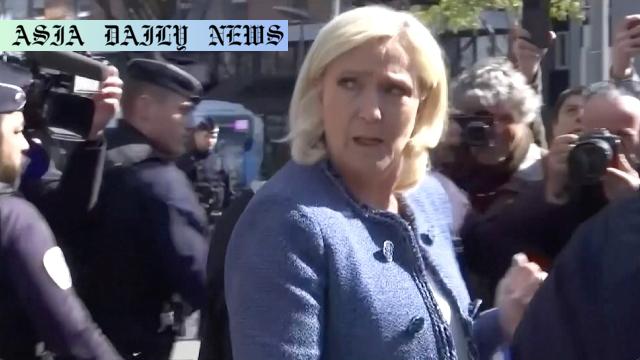Marine Le Pen: Far-right French politician banned from the 2027 election over embezzlement conviction.
Marine Le Pen has been convicted of embezzling EU funds and banned from office for five years.
Court ruling casts doubt on her participation in the 2027 French presidential election.
Le Pen plans to appeal the decision, calling it politically motivated.
The case involves allegations of misappropriating EU funds allocated for parliamentary aides.
National Rally President Jordan Bardella criticizes the ruling, claiming it undermines French democracy.

Marine Le Pen Convicted of Embezzling EU Funds
French far-right political leader Marine Le Pen faces a significant setback after being banned from public office for five years. The Paris court’s decision came after convicting her of embezzling European Union funds between 2004 and 2016. These funds, allocated for EU parliamentary aides, were reportedly diverted to finance the operations of her far-right party, the National Rally. The court also handed her a four-year prison sentence, two years of which are suspended. The ruling effectively jeopardizes her bid for the French presidency in 2027, a race where she was seen as a frontrunner with strong national support.
Implications for French Political Landscape
The decision to bar Le Pen has sent shockwaves through the French political sphere. As an influential figure in France’s political dynamics, her potential candidacy was a focal point leading up to the next election. Critics have been quick to debate whether the ruling was a fair judicial proceeding or a tool to undermine her chances at higher office. Le Pen publicly accused the ruling of being politically motivated, stating it was an attempt to prevent her from being elected as president. The shadow of this controversy adds uncertainty to the legitimacy and transparency of French politics.
The Appeal Process and Future Uncertainty
Le Pen has declared her intention to appeal against the ruling, maintaining her innocence. However, French newspaper Le Monde has highlighted a significant hurdle in the appeal process: judicial delays. It’s unlikely that her appeal would see resolution before the 2027 election, leaving her political career hanging in the balance. Her party, the National Rally, has yet to announce how they plan to replace her as their potential candidate for the presidency. Meanwhile, her ban poses broader questions about the integrity of French democracy and the future trajectory of far-right politics within the country.
Wider Implications Beyond France
Marine Le Pen’s predicament is not confined to national borders. As a prominent figure in far-right movements across Europe, her legal troubles could impact similar political factions in neighboring countries. The case also underscores the complicated relationship between national politics and EU regulations. As European Union institutions enforce tighter oversight over fund allocation, other politicians with similar accusations may face equal scrutiny. For France, these developments could mark a turning point in public accountability and the role of judicial intervention in shaping political future.
Commentary
A Politically Charged Ruling?
The recent court ruling against Marine Le Pen has undoubtedly raised some critical questions about the intersection of law and politics in France. While the case itself pertains to allegations of embezzlement, the broader context suggests a potential political fallout. As one of the most prominent leaders on the French far-right, Le Pen’s ban from office carries implications that extend beyond the legal framework. Is this a just action to safeguard public funds, or a strategic move to stifle opposition? This duality is at the heart of debates being held both nationally and internationally in political circles.
Impact on French Democracy
The decision also raises concerns over the perceived health of French democracy. Her party’s leader, Jordan Bardella, went as far as to claim that democracy itself was “killed” by such rulings. Though this might sound hyperbolic, the controversy indeed initiates a discussion on whether judicial systems are being wielded as tools to eliminate potential threats. Whether or not one supports Le Pen’s policies, it’s difficult not to feel that the timeframe for an appeal unfairly eliminates her from the 2027 race. Of course, upholding legal integrity is paramount in any democracy, but the finer nuances of this case lead to doubts about political impartiality.
A Critical Moment for Europe’s Far-Right Movements
This ruling may also mark the beginning of a broader reckoning within Europe’s far-right movements. With Le Pen as one of the strongest figures symbolizing resistance to EU policies and stronger nation-state autonomy, her disqualification could weaken similar sentiments across other member nations. The balance between combating corruption and respecting democratic plurality becomes increasingly delicate. Politicians, particularly those spearheading controversial ideologies, may now find themselves under heightened scrutiny from both the judicial systems and their populace.
Overall, this case represents not just a setback for Marine Le Pen but a crossroads for France as it contemplates the greater values of democracy and fairness. Whether this ruling ensures justice or whether it nudges French politics towards polarization remains to be seen. One thing, however, is clear: the 2027 presidential race will now unfold under a shadow of controversy.


